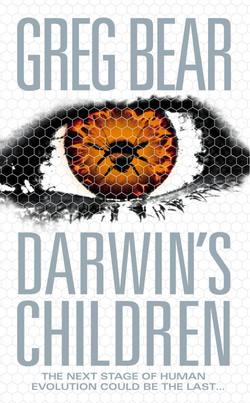Читать книгу Darwin’s Children - Greg Bear - Страница 34
CHAPTER TWENTY-NINE Joseph Goldberger School for Children with Special Needs, Emergency Action Ohio, Central District Authority
ОглавлениеA small contingent of Ohio National Guard trucks—Dicken counted six, and about a hundred troops—had drawn up at the crossroads. A perennial around the school, blooming every spring and summer, dying back in the winter, protesters stood in clumps away from the troops and the alarm trip wires. Dicken guessed that today they numbered three or four hundred, more than usual and more energetic as well. Most of the protesters were younger than thirty, many younger than twenty. Some wore brightly tie-dyed T-shirts and baggy slacks and had felted their hair in long bleached dreadlocks. They sang and shouted and waved signs denouncing “Virus Abominations” genetically engineered by corporate mad scientists. Two news trucks poked their white dish antennae at the sky. Reporters were out interviewing the protesters, feeding the hungry broadband predigested opinion and some visuals. Dicken had seen all this many times.
On the news, the protesters’ standard line was that the new children were artificial monsters designed to help corporations take over the world. GM Kids, they called them, or Lab Brats, or Monsanto’s Future Toadies.
Pushed back almost into the grass and gravel of a makeshift parking lot were a few dozen parents. Dicken could easily tell them apart from the protesters. The parents were older, conservatively dressed, worn down and nervous. For them, this was no game, no bright ritual of youthful passage into a dull and torpid maturity.
The staff car and its two escorts approached the first perimeter gate through a weave of concrete barricades. Protesters swarmed the fence, swinging their signs in the direction of the protected road. The largest sign out front, scrawled in red marker and brandished by a skinny boy with prominent bad teeth, read, HEY HEY USA/ DON’T FUCK WITH NATURE’S DNA!
“Just shoot them,” Dicken muttered.
Augustine nodded his tight-lipped concurrence.
Damn, we agree on something, Dicken thought.
In the beginning, the protesters had nearly all been parents, arriving at the schools by the thousands, some hangdog and guilty, some grim and defiant, all pleading that their children be allowed to go home. Back then, the nursery buildings had been filled and the dorms under construction or empty. The parents had mounted their vigils year-round, even in the dead of winter, for more than five years. They had been the best of citizens. They had surrendered their children willingly, trusting government promises that they would eventually be returned.
Mark Augustine had been unable to fulfill that promise, at first because of what he thought he knew, but in later years because of grim political reality.
Americans by and large believed they were safer with the virus children put away. Sealed up, out of sight. Out of range of contagion.
Dicken watched Augustine’s expression change from studied indifference to steely impassivity as the staff car climbed the sloping road to the plateau. There the massive complex sat flat and ugly like a spill of children’s blocks on the Ohio green.
The car maneuvered around the barricades and pulled up to the dazzling concrete gatehouse, whiter even than the clouds. As the guards checked their schedule of appointments and consulted with the Secret Service agents, Augustine stared east through the car window at a row of four long, ocher-colored dormitories.
It had been a year since Augustine had last inspected Goldberger. Back then, lines of kids had moved between classrooms, dormitories, and cafeteria halls, attended by teachers, interns, security personnel. Now, the dormitories seemed deserted. An ambulance had been parked by the inner gate to the barracks compound. It, too, was unattended.
“Where are the kids?” Dicken asked. “Are they all sick?”
